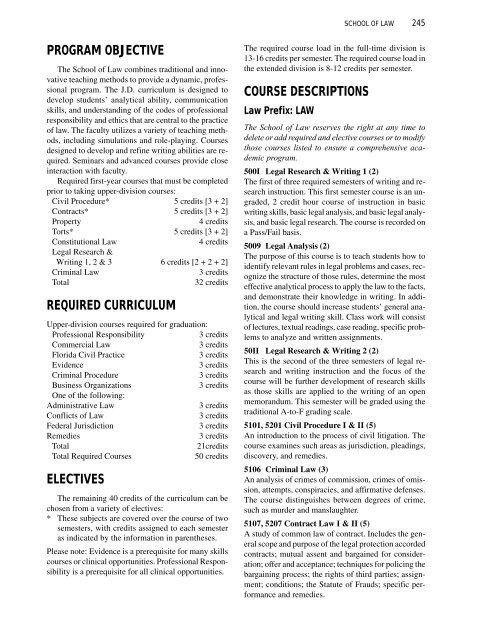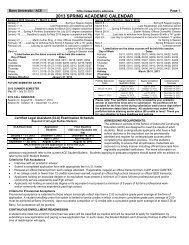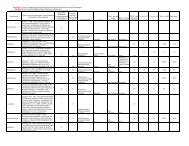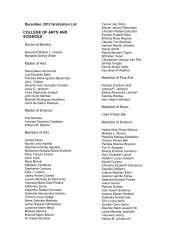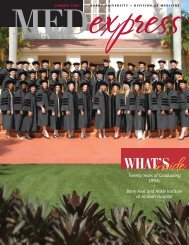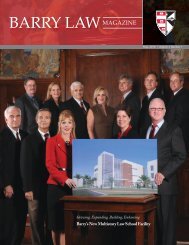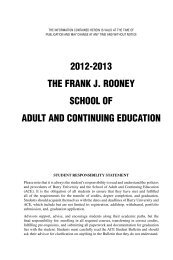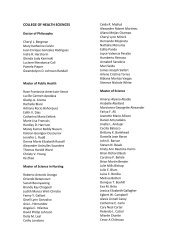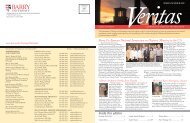2004-2005 - Barry University
2004-2005 - Barry University
2004-2005 - Barry University
You also want an ePaper? Increase the reach of your titles
YUMPU automatically turns print PDFs into web optimized ePapers that Google loves.
PROGRAM OBJECTIVE<br />
The School of Law combines traditional and innovative<br />
teaching methods to provide a dynamic, professional<br />
program. The J.D. curriculum is designed to<br />
develop students’ analytical ability, communication<br />
skills, and understanding of the codes of professional<br />
responsibility and ethics that are central to the practice<br />
of law. The faculty utilizes a variety of teaching methods,<br />
including simulations and role-playing. Courses<br />
designed to develop and refine writing abilities are required.<br />
Seminars and advanced courses provide close<br />
interaction with faculty.<br />
Required first-year courses that must be completed<br />
prior to taking upper-division courses:<br />
Civil Procedure* 5 credits [3 + 2]<br />
Contracts* 5 credits [3 + 2]<br />
Property 4 credits<br />
Torts* 5 credits [3 + 2]<br />
Constitutional Law 4 credits<br />
Legal Research &<br />
Writing 1, 2 & 3 6 credits [2 + 2 + 2]<br />
Criminal Law 3 credits<br />
Total 32 credits<br />
REQUIRED CURRICULUM<br />
Upper-division courses required for graduation:<br />
Professional Responsibility 3 credits<br />
Commercial Law 3 credits<br />
Florida Civil Practice 3 credits<br />
Evidence 3 credits<br />
Criminal Procedure 3 credits<br />
Business Organizations 3 credits<br />
One of the following:<br />
Administrative Law 3 credits<br />
Conflicts of Law 3 credits<br />
Federal Jurisdiction 3 credits<br />
Remedies 3 credits<br />
Total 21credits<br />
Total Required Courses 50 credits<br />
ELECTIVES<br />
The remaining 40 credits of the curriculum can be<br />
chosen from a variety of electives:<br />
* These subjects are covered over the course of two<br />
semesters, with credits assigned to each semester<br />
as indicated by the information in parentheses.<br />
Please note: Evidence is a prerequisite for many skills<br />
courses or clinical opportunities. Professional Responsibility<br />
is a prerequisite for all clinical opportunities.<br />
SCHOOL OF LAW 245<br />
The required course load in the full-time division is<br />
13-16 credits per semester. The required course load in<br />
the extended division is 8-12 credits per semester.<br />
COURSE DESCRIPTIONS<br />
Law Prefix: LAW<br />
The School of Law reserves the right at any time to<br />
delete or add required and elective courses or to modify<br />
those courses listed to ensure a comprehensive academic<br />
program.<br />
500I Legal Research & Writing 1 (2)<br />
The first of three required semesters of writing and research<br />
instruction. This first semester course is an ungraded,<br />
2 credit hour course of instruction in basic<br />
writing skills, basic legal analysis, and basic legal analysis,<br />
and basic legal research. The course is recorded on<br />
a Pass/Fail basis.<br />
5009 Legal Analysis (2)<br />
The purpose of this course is to teach students how to<br />
identify relevant rules in legal problems and cases, recognize<br />
the structure of those rules, determine the most<br />
effective analytical process to apply the law to the facts,<br />
and demonstrate their knowledge in writing. In addition,<br />
the course should increase students’ general analytical<br />
and legal writing skill. Class work will consist<br />
of lectures, textual readings, case reading, specific problems<br />
to analyze and written assignments.<br />
50II Legal Research & Writing 2 (2)<br />
This is the second of the three semesters of legal research<br />
and writing instruction and the focus of the<br />
course will be further development of research skills<br />
as those skills are applied to the writing of an open<br />
memorandum. This semester will be graded using the<br />
traditional A-to-F grading scale.<br />
5101, 5201 Civil Procedure I & II (5)<br />
An introduction to the process of civil litigation. The<br />
course examines such areas as jurisdiction, pleadings,<br />
discovery, and remedies.<br />
5106 Criminal Law (3)<br />
An analysis of crimes of commission, crimes of omission,<br />
attempts, conspiracies, and affirmative defenses.<br />
The course distinguishes between degrees of crime,<br />
such as murder and manslaughter.<br />
5107, 5207 Contract Law I & II (5)<br />
A study of common law of contract. Includes the general<br />
scope and purpose of the legal protection accorded<br />
contracts; mutual assent and bargained for consideration;<br />
offer and acceptance; techniques for policing the<br />
bargaining process; the rights of third parties; assignment;<br />
conditions; the Statute of Frauds; specific performance<br />
and remedies.


